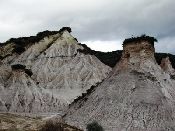| Study site locations |
 |
|
DESIRE focused its research on 17 study sites, all in semi-arid environments but distributed across the world from Chile to China. Land use on the sites includes arable crops (both irrigated and dry), forestry or tree crops and grazing land. The range of degradation problems experienced includes erosion (caused by wind and water), salinisation, vegetation degradation and wild fire.
The majority of sites have a problem with soil rosion by water and drought. While erosion is a more long term problem, associated by the stakeholders with a slow loss of fertile soil leading to a decline in yield and yield quality, drought is a much more acute problem. It is often experienced and leads to harvest failure or decrease in grazing capavaity. Technical solutions such as irrigation systems do not always work or are applied wrongly (Nestos River Basin, Russia), causing water logging, salinization and even erosion by excessive surface irrigation leading to runoff.
In their field experiments, most sites with erosion concentrated on interfering with runoff (countour tillage), making flow barriers or terrace like structures (Turkey, Cape Verde, China), or protecting the surface with mulch (Spain, Crete, Morroco). Most sites with drought problems concentrated on water harvesting techniques, sometimes using or reviving traditional methods (Spain, Tunisia). Others tried new solutions such as collection of snow melt (Russia), minimum tillage (Morocco, Chile), collection ditches (Chile, China). Agronomic measures such as intercropping and alternative crop types were tested in Spain, Chile, Cape Verde and to some extent in Mexico. |
||||||||||||||||||||||||||||||||||
Study sites

Acknowledgement
The DESIRE project was
|
DESIRE brought together the expertise of
26 international research institutes
and non-governmental organisations.
This website does not necessarily
represent the opinion of the
European Commission. The European
Commission is not responsible for
any use that might be made of the
information contained herein. 
 Study sites
Study sites